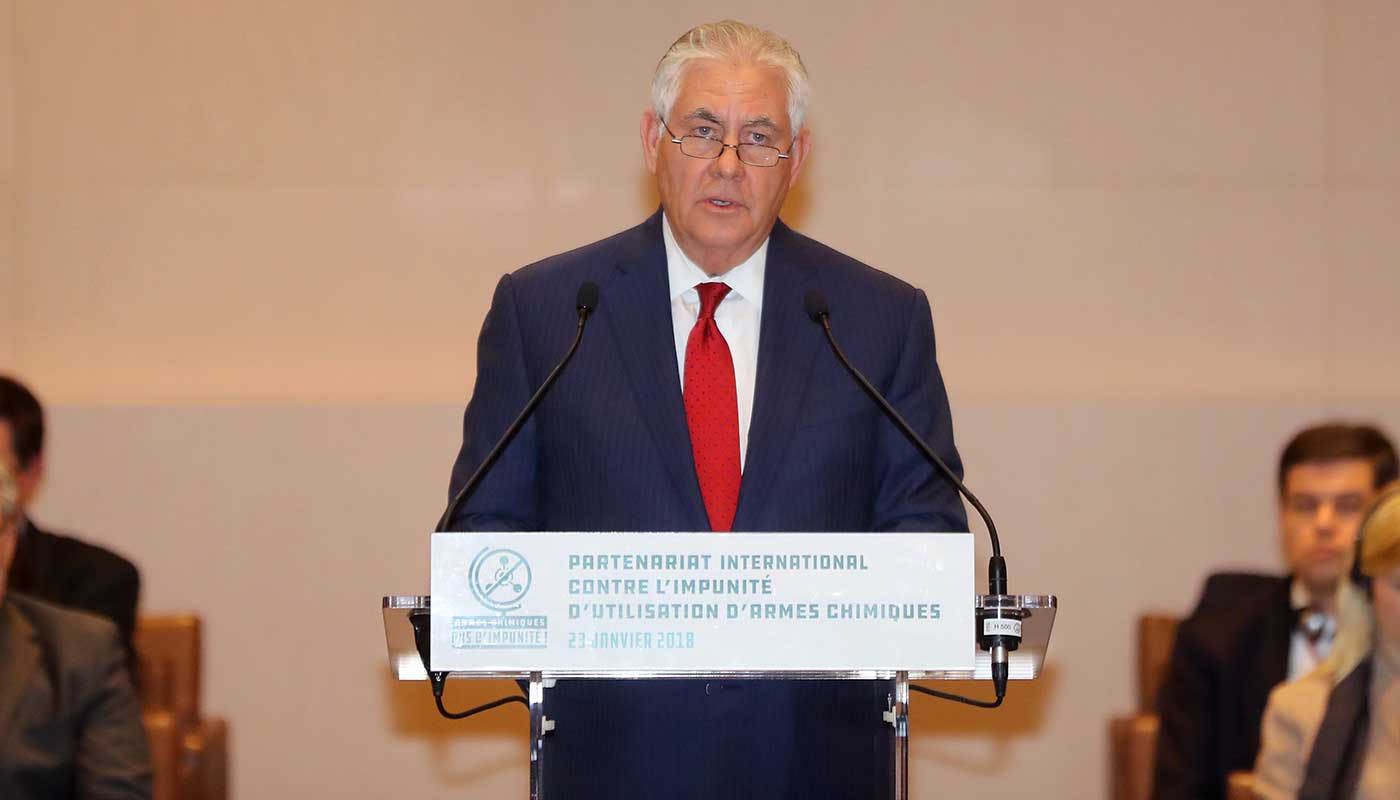Russia ‘bears responsibility’ for gas attacks in Syria
Rex Tillerson calls on Syrian leader to stop using chemical weapons

A free daily email with the biggest news stories of the day – and the best features from TheWeek.com
You are now subscribed
Your newsletter sign-up was successful
US Secretary of State Rex Tillerson has said that Russia bears the ultimate responsibility for suspected chemical weapon attacks carried out by the regime of Syrian President Bashar al-Assad.
Speaking at a summit in Paris to push for sanctions and criminal charges against the perpetrators of chemical attacks in Syria, Tillerson also blasted Russia for “shielding” Syria from UN sanctions.
The comments came a day after an “apparent chlorine gas attack” in east Ghouta, an enclave of rebel support in the Damascus suburbs, which left at least 20 civilians – most of them children – struggling to breathe.
The Week
Escape your echo chamber. Get the facts behind the news, plus analysis from multiple perspectives.

Sign up for The Week's Free Newsletters
From our morning news briefing to a weekly Good News Newsletter, get the best of The Week delivered directly to your inbox.
From our morning news briefing to a weekly Good News Newsletter, get the best of The Week delivered directly to your inbox.
“Russia’s failure to resolve the chemical weapons issue in Syria calls into question its relevance to the resolution to the overall crisis,” Tillerson said, before suggesting that Russia abstain from voting on further UN sanctions against Syria.
In a statement, US ambassador to the United Nations Nikki Haley said the latest attack was “yet another demonstration” of Syria’s “blatant disregard for international law and cruel indifference for the lives of its own people.”
The Guardian reports that between 2012 and 2017, there were more than 130 reported chemical attacks in Syria, “with the majority attributed to the Assad regime.”
The Washington Post says there have been “four such attacks since the start of the year, including two on Monday”, and that “dozens of civilians have been treated for symptoms of exposure to chlorine.”
A free daily email with the biggest news stories of the day – and the best features from TheWeek.com
-
 Why is the Trump administration talking about ‘Western civilization’?
Why is the Trump administration talking about ‘Western civilization’?Talking Points Rubio says Europe, US bonded by religion and ancestry
-
 Quentin Deranque: a student’s death energizes the French far right
Quentin Deranque: a student’s death energizes the French far rightIN THE SPOTLIGHT Reactions to the violent killing of an ultraconservative activist offer a glimpse at the culture wars roiling France ahead of next year’s elections
-
 Secured vs. unsecured loans: how do they differ and which is better?
Secured vs. unsecured loans: how do they differ and which is better?the explainer They are distinguished by the level of risk and the inclusion of collateral
-
 Epstein files topple law CEO, roil UK government
Epstein files topple law CEO, roil UK governmentSpeed Read Peter Mandelson, Britain’s former ambassador to the US, is caught up in the scandal
-
 Iran and US prepare to meet after skirmishes
Iran and US prepare to meet after skirmishesSpeed Read The incident comes amid heightened tensions in the Middle East
-
 Israel retrieves final hostage’s body from Gaza
Israel retrieves final hostage’s body from GazaSpeed Read The 24-year-old police officer was killed during the initial Hamas attack
-
 China’s Xi targets top general in growing purge
China’s Xi targets top general in growing purgeSpeed Read Zhang Youxia is being investigated over ‘grave violations’ of the law
-
 Panama and Canada are negotiating over a crucial copper mine
Panama and Canada are negotiating over a crucial copper mineIn the Spotlight Panama is set to make a final decision on the mine this summer
-
 Why Greenland’s natural resources are nearly impossible to mine
Why Greenland’s natural resources are nearly impossible to mineThe Explainer The country’s natural landscape makes the task extremely difficult
-
 Iran cuts internet as protests escalate
Iran cuts internet as protests escalateSpeed Reada Government buildings across the country have been set on fire
-
 US nabs ‘shadow’ tanker claimed by Russia
US nabs ‘shadow’ tanker claimed by RussiaSpeed Read The ship was one of two vessels seized by the US military